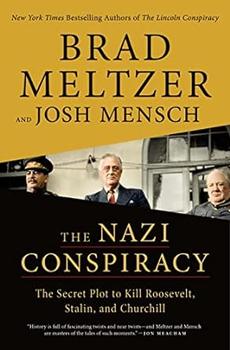Summary | Excerpt | Reading Guide | Discuss | Reviews | Beyond the Book | Readalikes | Genres & Themes | Author Bio

The Secret Plot to Kill Roosevelt, Stalin, and Churchill
by Brad Meltzer, Josh Mensch1
TWO YEARS EARLIER …
The Pacific Ocean
December 7, 1941
The ships have been traveling—secretly—for ten days.
Now, on this quiet Sunday morning, as the first light of dawn winks from the Pacific Ocean, the fleet prepares to change course.
There's no land in sight. Measured against the vast scale of the Pacific, this collection of warships is a tiny blip. But on a human scale, the fleet is enormous: six massive aircraft carriers, two battleships, nine destroyers, three cruisers, eight fuel tankers, and several small support ships. Below the waves are twenty-three accompanying submarines. On each carrier, the flight decks are lined with dozens of planes. In total, tens of thousands of crewmembers are aboard and mobilized.
For most of their ten-day journey, these ships have traveled eastward. Astonishingly, their movement across more than 3,500 miles of water—from a secluded bay on East Asian shores to here in the Central Pacific—has remained undetected by radar systems throughout the ocean. Every aspect of the fleet's journey has been planned and conducted at the highest levels of secrecy.
Now, several hundred miles south of the Aleutian Islands, the fleet commander issues a series of orders to chart a southern course. As the ships begin to move in the new direction, the slower-moving tankers break off from the fleet. The rest accelerate, going from twenty knots to twenty-four knots, a speed that provides momentum suitable for aircraft to launch from carrier decks.
At 6:05 a.m., a green light is waved on the deck of the flagship carrier. It's a signal to launch. One by one, engines roar and warplanes speed across the runway, rising into the dark morning air above the ocean waters. The other carriers simultaneously launch planes of their own.
The aircraft circle above the fleet and begin to maneuver. A total of 183 planes are soon flying south in battle formation, leaving the ships behind.
A reconnaissance plane shoots ahead of the others, disappearing in the clouds. The pilot's job is to scout the sea and air ahead, tuning into nearby radio frequencies to see if there's any indication that either the planes or carriers have been detected.
Ninety minutes later, at roughly 7:40 a.m., the lead pilots can see a sliver of land in the distance. They send a signal to the others: The air fleet remains undetected. Visibility is strong. The coast is clear. Time to attack.
The target? A small island of less than six hundred square miles. It's a place they're not at war with—yet the Japanese air fleet commanders are about to unleash the full destructive power of their fighter planes, bombers, torpedo planes, and dive-bombers.
This is a surprise attack, a preemptive strike intended to inflict maximum shock and devastation.
Within the next two hours, the world will change.
Copyright © 2022 by Forty-Four Steps, Inc
Your guide toexceptional books
BookBrowse seeks out and recommends the best in contemporary fiction and nonfiction—books that not only engage and entertain but also deepen our understanding of ourselves and the world around us.